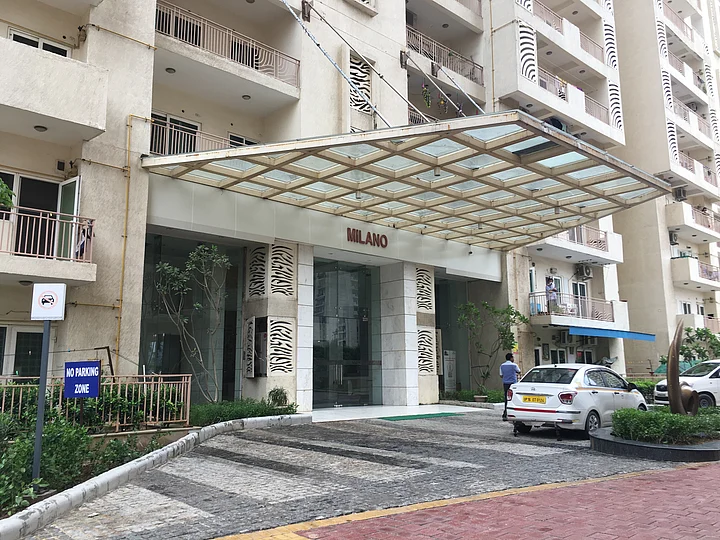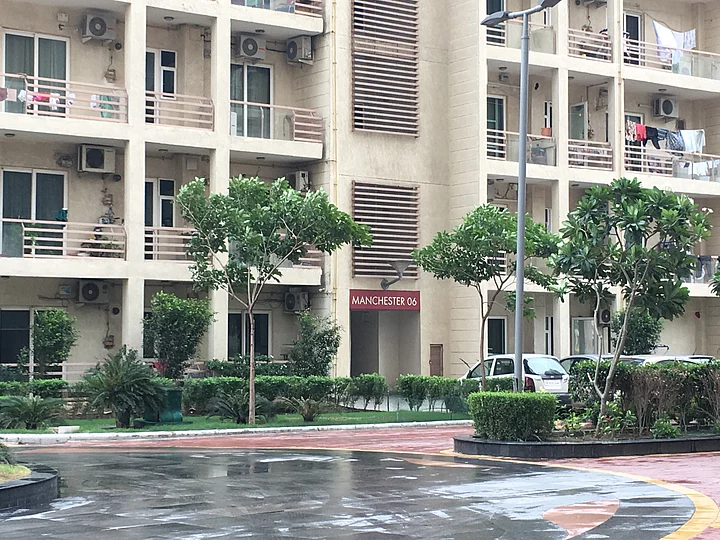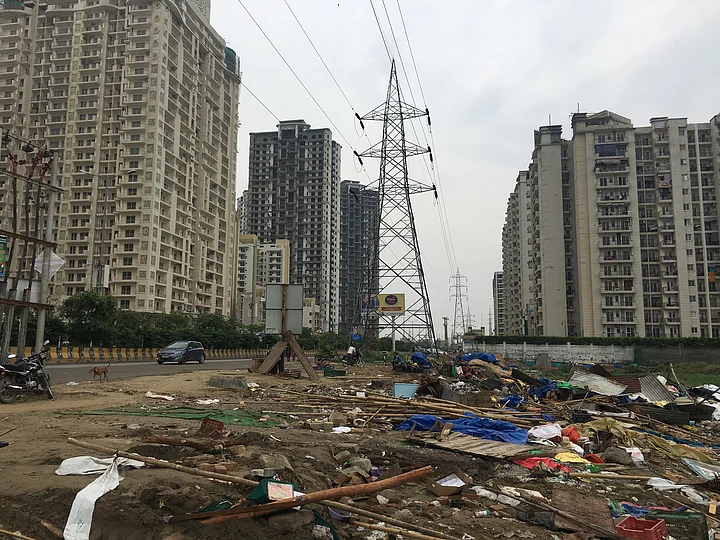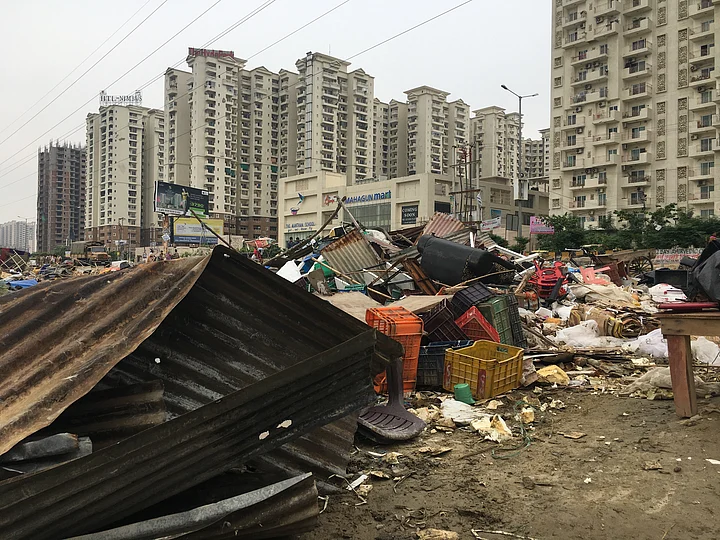Two farmers, squatting on their haunches, are eating roti in a lush, green field. Their bulls are grazing around them on a rainy day in Uttar Pradesh. It’s an idyllic scene, except the farmers are surrounded by matchbox-like concrete skyscrapers. Casting a shadow over the grazing bulls is a large building called Mahagun Moderne.
Mahagun Moderne, a residential township in Sector-78 in Noida, hit the headlines when a riot-like situation occurred between residents and domestic workers on 12 July. The confrontation was ostensibly sparked after a domestic worker called Zohra Bibi went ‘missing’. Stones were pelted, police had to be brought in and security officers’ cabins were vandalised. An urban class conflict, playing out on Facebook timelines and in Whatsapp videos.
Too caught up to read? Listen to the story:
One week later, some facts are clear. But the events of 12 July reveal a deeper fault line of ‘us vs them’ between the residents and the domestic workers. Whether in the high-rises of Mahagun or in the shanties nearby where migrant workers live, truth depends on who you are talking to.
In a Concrete Tower, An Indispensable ‘Help’
Manhattan, Avlon Betina, Manchester.
The first thing which strikes one about Mahagun Moderne are the names of the towers. Spread over 25-acres and marketed as homes which “mirror the taste of affluent class”, Mahagun Moderne has 2,000 occupied flats. There are CCTV cameras in every corridor and every lift, and strict entries for each tower. And within the houses, there is a palpable sense of fear and disbelief at how the “maids got in with such impunity.”
- 01/02(Photo: Shadab Moizee)
- 02/02(Photo: Shadab Moizee)
On condition of anonymity, a resident says, “This has never happened before, first time we are hearing of it”.
She goes on to talk about how families should treat their domestic help with respect, “pyaar se baat karni chahiye.” After a pause, she shakes her head and rues that this is how most maids are anyway. “They all complain after they work, it is in their nature…”
Most Mahagun residents are keeping a track of developments over the past week using a common group, with videos, counter-videos and images being circulated as ‘evidence’. Or to speculate, whose domestic worker could possibly have been involved in the ruckus. Pieced together from news reports, police statements and (cue: post-truth reality) circulated Whatsapp videos and images, a fragile narrative of truth emerges.
In Mahagun Moderne, most domestic workers start arriving at 5 am in the morning. On 12 July, there was a knot of domestic workers outside the gate in the morning, with a sizeable crowd forming by 7:30 am. The crowd allegedly consisted of domestic workers and daily wage labourers who live around Mahagun in three different settlements.
As night-shift security guards struggled to control the crowd, the mob broke through; breaking glass walls of the security guards’ room, pelting stones and running straight for Harshu Sethi’s house, Zohra’s employer. The crowd alleged that the Sethis had beaten up Zohra, who had been ‘missing’ since the previous night.
In the ensuing ruckus, both Zohra and the Sethis filed a FIR, apart from two separate police complaints filed by the security guards and Mahagun residents.
A day later, it was reported that Zohra wasn’t locked up, but had voluntarily stayed for a night in another resident’s house after she left the Sethi resident where she had been accused of robbery. Residents of Mahagun refused to comment specifically on the 12 July incident, but residents of adjoining society who were tracking the developments of the case closely, said that Zohra hadn’t been paid for two months.
However, whether a robbery took place is yet to be confirmed. In CCTV footage circulated among residents, and accessed by The Quint, Zohra is seen walking off with guards in the morning of the incident. (However, The Quint has been unable to independently confirm the authenticity of the video.)
Immediately afterwards, Mahagun society banned all domestic workers, citing a security threat from ‘Bangladeshi’ maids.
Like most societies, there is a ‘rate-list’ which is circulated among residents of Mahagun, where the rates at which the maids must be paid are specified beforehand. Rs 1,500 for cleaning a 2BHK, Rs 1,700 for a 3BHK, Rs 2,000 for cooking one-time dinner, etc. After the ‘ban’ when most residents were left without a maid, residents were forced to order food from outside, or go a day without dog walkers, cooks and cleaners.
On 17 July, Mahagun listed eighty-one domestic workers who were found to be guilty of participating in the mob and banned their entry. This list is based on maids who were spotted in videos and images from the incident. There is some inevitable confusion over names, and so those maids whose names are not even on the list must call up their employers. The employer fills out an undertaking ‘guarantee’ of the domestic worker; a move against anticipatory violence.
In Shanties, Empty Houses Tell a Story of Silence
A week later, most maids working in Mahagun said they weren’t a part of the mob. On 17 July, a row of shops outside Mahagun selling fresh vegetables with cobblers, tailors and services like ironing were demolished without due notice. In a settlement less than a kilometre away from Mahagun where domestic workers live, most houses are empty.
- 01/02Rows of shops outside Mahagun were demolished. (Photo: Shadab Moizee)
- 02/02(Photo: Shadab Moizee)
Urvashi, a domestic worker who works in Mahagun, didn’t go to work on the day of the violence. Now, she has her ‘card’ – a token which is given out to every domestic worker working in Mahagun – and an employer who is attesting that she wasn’t involved.
Speaking on the condition of anonymity, another maid from Cooch Behar in West Bengal says she wasn’t present at the time of the violence. Working for four years with the same family, she says that her family “treats her well” and she has “had no reason to complain.”
Imran is a shopkeeper, and responsible for renting out 35-odd rooms made of corrugated tin in a cluster of houses across Mahagun. He is a worried man, since almost 21 families have fled the shanty after the morning of the violence. He was picked up by a policeman on the night of the incident, but released the next morning, after he proved himself to be from Cooch Behar in West Bengal.
Not Bangladesh.
“Whatever happened in Mahagun, we don't know. Because of fear of whatever happened, my tenants have run away. Our electricity and water has also been taken away. On the day of the incident, we locked up the shop and slept. The police woke us up, picked us up and let us off. Out of the people here, they have searched some people and maybe taken them to the Daasna jail. We don’t know.”
A pause.
“Those involved in the fight, they have fled. They ran away at night only. Those who are here, they weren’t involved.”
Shahid Ali owns a fruit shop, and on the day of violence had gone to the wholesale market to buy fruits. When he returned from the market, he saw a huge crowd outside Mahagun and went to see what the “hungama” was about. But did he know what happened?
Some say that a maid had gone, and they hadn’t paid, but then they stopped her from going outside. Someone said that there was a theft, and that she had stolen the money. Bas aise hi. What the fight was about we don’t know, we haven’t seen, neither do we know.
Truth is, sometimes, subjective. But consequences are not.
Why did a mob of around 500 people attack a single house in Mahagun Moderne? Was Zohra Bibi assaulted? These are questions that may lead to the truth. But the difference in the impact of violence on 12 July on domestic workers of Sector 78 and the residents of Mahagun Moderne is evident.
For some, uprooting a life, and fleeing secure homes. For others, adjusting to an uncomfortable reality.




